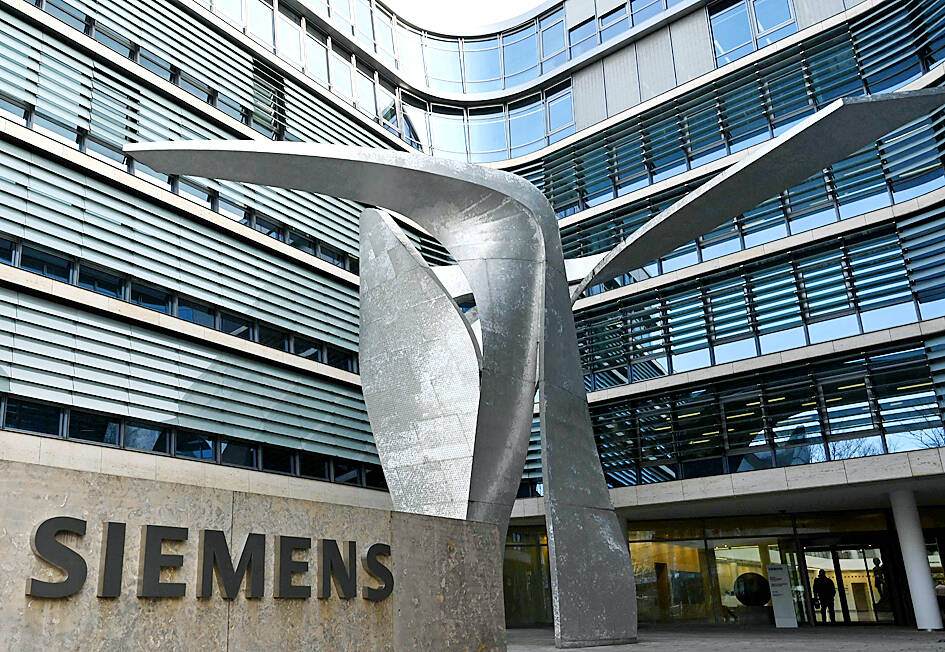Siemens AG raised its outlook for a second time this fiscal year after revenue and orders jumped, with the company’s main businesses pairing industrial products with digital solutions driving the result.
The German company now sees comparable revenue growth of 9 to 11 percent for the year, up from 7 to 10 percent, driving a rise in expected earnings per share, Siemens said yesterday.
After a surge in demand during the fiscal second quarter, Siemens said that orders are set to normalize during the second half of this year.

Photo: AP
The company said that its order backlog rose again during the quarter to an all-time high of 105 billion euros (US$113.8 billion), following a record intake in the mobility segment, which makes trains.
“We are sitting on a record high order backlog, which gives us very good visibility on fiscal 2023 and into 2024,” Siemens CEO Roland Busch said in an interview with Bloomberg Television. “We see a normalization of order intake, which is good as we want to go back to better delivery times.”
For the second half of the fiscal year, Siemens expects revenue of 30 billion euros from its order bank alone.
At Siemens’ main divisions, digital industries and smart infrastructure, the picture was more mixed. While profit surged, orders at the unit making factory products and related digital services fell 10 percent. The company still raised its profit margin outlook for digital industries to as much as 23.5 percent, up from as much as 22 percent.
At smart infrastructure, with products helping buildings reduce their carbon footprint, orders rose 9 percent, and Siemens also boosted expectations for revenue and returns.
“Think about the transformation we are in with regards to climate change,” Busch said. “We have to drive up efficiency and get our energy consumption down — we believe we are sitting on a supercycle with a perfect portfolio serving this wave.”
Siemens is reaping the results of a major strategic reset of its business, shedding heavy-duty equipment in favor of software-driven product lines with higher profitability levels.
During the fiscal second quarter, comparable revenue rose 15 percent to 19.4 billion euros, beating analyst estimates of 18.7 billion euros. Net income rose to 3.48 billion euros, above analyst estimates of 3.1 billion euros.
Siemens’ bottom line profited from a 1.59 billion euros accounting gain related to the partial impairment reversal on its stake in Siemens Energy.

Vincent Wei led fellow Singaporean farmers around an empty Malaysian plot, laying out plans for a greenhouse and rows of leafy vegetables. What he pitched was not just space for crops, but a lifeline for growers struggling to make ends meet in a city-state with high prices and little vacant land. The future agriculture hub is part of a joint special economic zone launched last year by the two neighbors, expected to cost US$123 million and produce 10,000 tonnes of fresh produce annually. It is attracting Singaporean farmers with promises of cheaper land, labor and energy just over the border.

US actor Matthew McConaughey has filed recordings of his image and voice with US patent authorities to protect them from unauthorized usage by artificial intelligence (AI) platforms, a representative said earlier this week. Several video clips and audio recordings were registered by the commercial arm of the Just Keep Livin’ Foundation, a non-profit created by the Oscar-winning actor and his wife, Camila, according to the US Patent and Trademark Office database. Many artists are increasingly concerned about the uncontrolled use of their image via generative AI since the rollout of ChatGPT and other AI-powered tools. Several US states have adopted

A proposed billionaires’ tax in California has ignited a political uproar in Silicon Valley, with tech titans threatening to leave the state while California Governor Gavin Newsom of the Democratic Party maneuvers to defeat a levy that he fears would lead to an exodus of wealth. A technology mecca, California has more billionaires than any other US state — a few hundred, by some estimates. About half its personal income tax revenue, a financial backbone in the nearly US$350 billion budget, comes from the top 1 percent of earners. A large healthcare union is attempting to place a proposal before

KEEPING UP: The acquisition of a cleanroom in Taiwan would enable Micron to increase production in a market where demand continues to outpace supply, a Micron official said Micron Technology Inc has signed a letter of intent to buy a fabrication site in Taiwan from Powerchip Semiconductor Manufacturing Corp (力積電) for US$1.8 billion to expand its production of memory chips. Micron would take control of the P5 site in Miaoli County’s Tongluo Township (銅鑼) and plans to ramp up DRAM production in phases after the transaction closes in the second quarter, the company said in a statement on Saturday. The acquisition includes an existing 12 inch fab cleanroom of 27,871m2 and would further position Micron to address growing global demand for memory solutions, the company said. Micron expects the transaction to